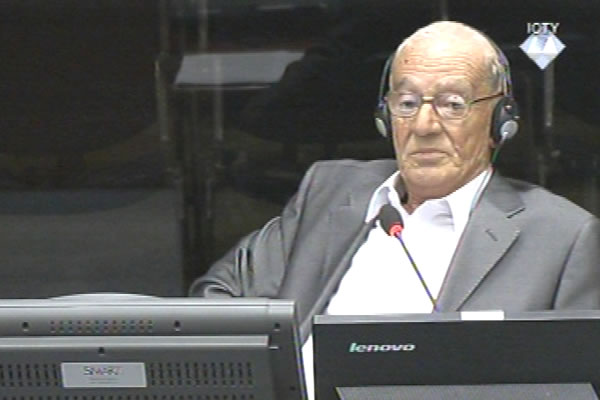Home
‘MUSLIM SIDE RESPONSIBLE FOR POWER CUTS IN SARAJEVO’
In his evidence in Ratko Mladic’s defense, Veljko Lubura, an engineer who worked for the Elektroprenos company in Republika Srpska, denied that the Serb side was to blame for the power cuts in Sarajevo. On the contrary, according to Lubura, the Bosnian side ‘showed no interest’ in improving the situation. Lubura contested the allegations in the report of the BH Elektroprivreda that in 1993, Sarajevo did not have power for a total of 140 days, including a period of 53 days in a row without electricity
 Veljko Lubura, defence witness at Rako Mladic trial
Veljko Lubura, defence witness at Rako Mladic trial Through the evidence of the former director of the Electroprenos branch office in Ilidza Veljko Lubura, Ratko Mladic’s defense intends to contest the prosecution’s allegations that the terror campaign in Sarajevo did not involve just the artillery and sniper attacks, but also preventing humanitarian relief from reaching the city and cutting off power, water and gas supply. During the war, the witness was the chief engineer in charge of the facilities providing electricity to 15 Bosnian Serb municipalities. Indirectly, the witness was in charge of providing power to the part of Sarajevo under siege. Lubura has previously given evidence in Radovan Karadzic’s defense. Today, the statement Lubura gave to Karadzic’s defense was admitted into evidence, with an addendum that pertained specifically to the Mladic trial.
In the statements, Lubura contradicted all of the prosecution’s claims. Lubura argued that the Serb side in fact did everything to make sure the power supply system was operational, in order to meet the needs of both the Serb settlements and the rest of Sarajevo too. In his statement to the defense team, Lubura claimed that the fighting hindered their efforts, as did the ‘obstructions by the Muslim side’. Nevertheless, the city received electricity regularly, using the transmission lines that ran through the Serb-controlled territory. There were occasional black-outs that lasted five to 10 days due to system failure, the witness explained. According to Lubura, the only time the power supply to the city was disrupted for a longer period was from December 1992 to January 1993 after Juka Prazina’s group shelled the substation in Blazuj. In mid-1993 when Serbs conquered Trnovo, the situation improved and the Bosnian Serb authorities wanted the citizens of Sarajevo to feel it, Lubura recounted. The ‘other side’ however, ‘showed no interest’ in improving the power supply in the city. Lubura assumed that it was because the electricity imported from Montenegro ‘had to be paid’.
In his replies to defense counsel Lukic, the witness said that he was the only person who could cut off the power in Sarajevo. But, as Lubura explained, he never did that and he never received any demands to do that, either from the military or civilian authorities. The 'top leadership' never issued any such orders, Lubura was adamant. To corroborate his claim that the obstructions originated in Sarajevo, the defense tendered into evidence an UNPROFOR document from June 1995. The document states that the ‘Bosnian side decided at the eleventh hour not to restore the utilities in the city’, urging UNPROFOR to take control of the Bacevo spring and of gas supply.
In the cross-examination, prosecutor Jeremy responded by showing several UNPROFOR documents stating the opposite, that the Serb side caused power cuts in Sarajevo. The reports note that ‘Serbs deny access’ to locations where the power lines were down, that repairs were underway on the ‘Bosnian side only, and not on the Serb side’ and that the situation improved only when Radovan Karadzic caved in and accepted an agreement to that effect. The witness replied that he didn’t know anything about that.
The prosecutor went on to contest Lubura’s claim that he was the only person who could turn off the power supply in Sarajevo; to that end, he produced a document from the VRS Main Staff signed by General Milovanovic, where the troops are ordered ‘not to interfere with the power and gas supply to the city without my permission’. The witness replied that the army was not at the top of the hierarchy when it came to the issues related to the power supply. ‘In order to have the power cut off, they had to submit a request to the head of the Elektroprivreda. He would then order me to do it, and I would relay the order to the dispatchers', the witness said.
The prosecutor then showed him a report of the BH Elektroprivreda. According to the report, during 1993 Sarajevo was without power for a total of 140 days, including a period when the power was off for 53 days in a row, from 21 June to 13 August 1993. Lubura replied that he couldn’t see ‘how they reached this figure, 53 days’. According to Lubura, the report was not true.
As the hearing drew to a close Zdravko Cvoro, a war-time official from Pale, continued his evidence.
Linked Reports
- Case : Mladic
- 2014-06-02 EVIDENCE ON EVENTS BEFORE AND AFTER PERIOD RELEVANT FOR INDICTMENT
- 2014-05-30 MARKALE 1 COMMISSION: PHANTOM OR REAL?
- 2014-05-30 APPLICATION FOR A CHANGE OF RESIDENCE
- 2014-06-04 WHY AND HOW MUSLIMS LEFT PALE
- 2014-06-05 SEVERED HEADS ALL OVER SARAJEVO
- 2014-06-06 PROSECUTION: ‘WITNESS IS INCONSISTENT AND INCREDIBLE’
